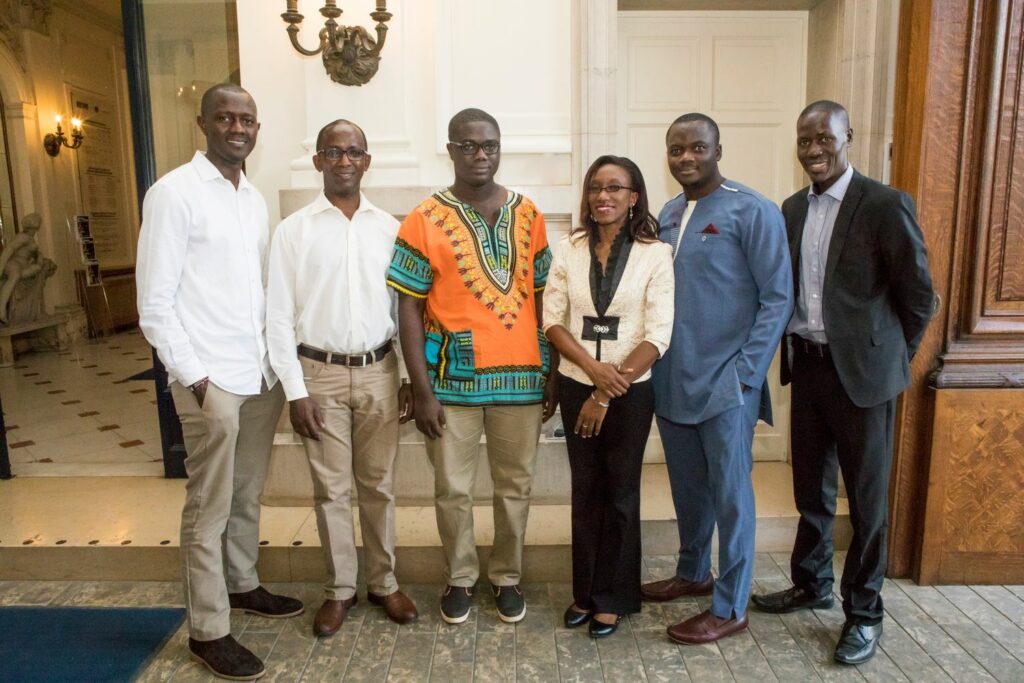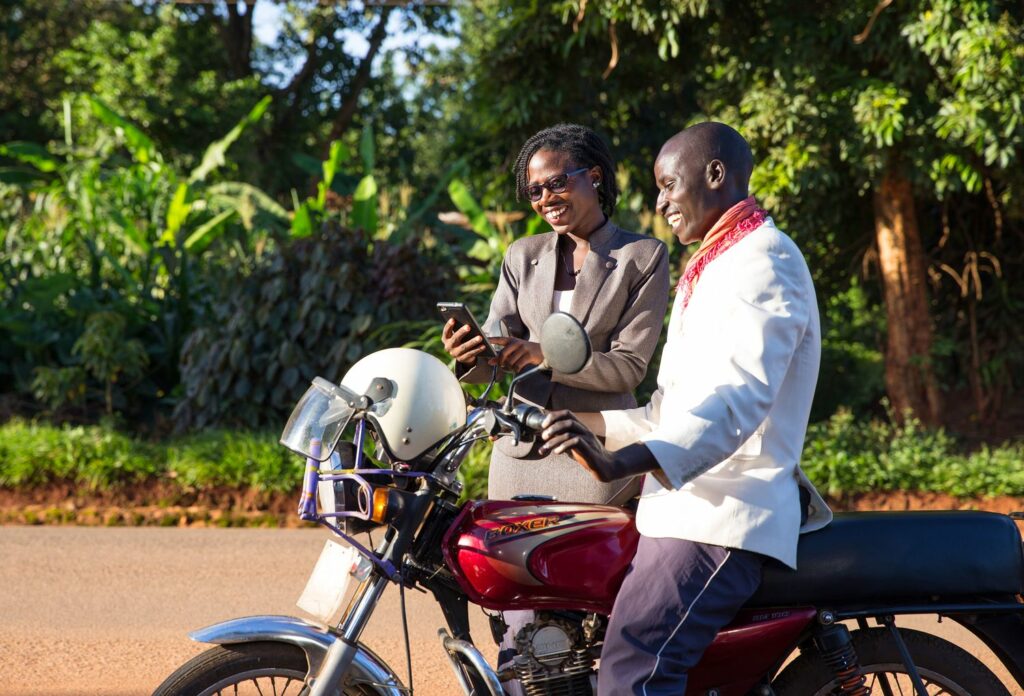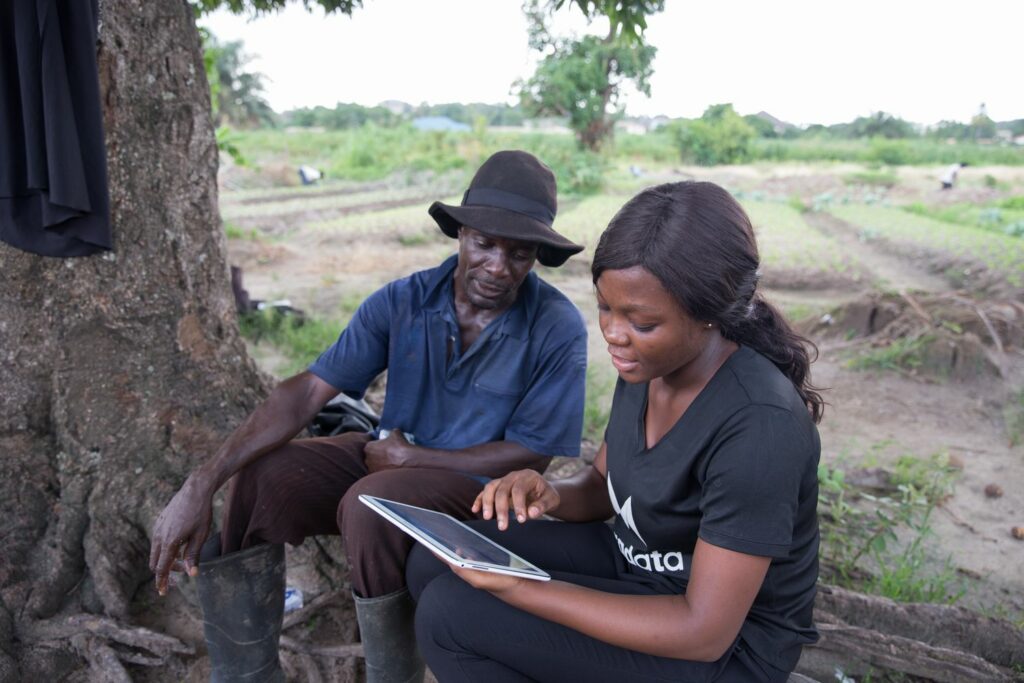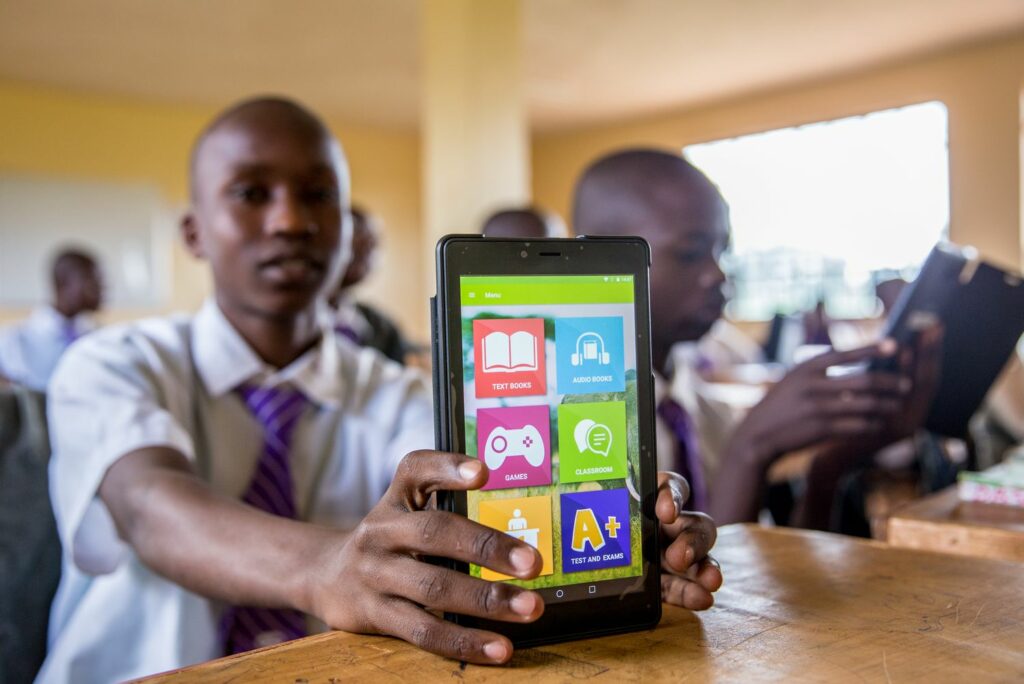
The KBF Africa Prize Winners 2016/2017: BarefootLaw, Farmerline and Kytabu
The 2016-2017 King Baudouin African Development Prize recognizes the outstanding achievements of three young, African tech-entrepreneurs who are driving social change across the continent.
By selecting BarefootLaw (Uganda), Farmerline (Ghana) and Kytabu (Kenya), the Selection Committee wished to showcase the creativity of young African entrepreneurs in innovative solutions that unlock the power of people and communities through the provision of better access to knowledge in fields as diverse as law (BarefootLaw), agriculture (Farmerline) and education (Kytabu), and by linking public and private sectors.
BarefootLaw is the first online legal service in East Africa. This free-of-charge platform helps those who are most vulnerable to understand and defend their basic rights.

Maureen Nuwamanya demonstrates to boda boda rider Tumwebaze Sam how he can access free legal advice from Barefoot Law through a cell phone.
As a law student, Gerald Abila wanted to share his knowledge to promote equal and fair access to justice for his countrymen. To attain this goal, he leveraged the high rate of social media users in Uganda. His aim was to make law easily accessible to citizens in order to empower them to claim their rights and access justice. With 12 million internet users (30% of the population) and 23 million mobile connections in the country, his project could easily extend his reach.
In 2013, after a year of thought, what was a simple Facebook Page turned into BarefootLaw Uganda, a non-profit organization (NGO) that delivers legal information, advice and support on a massive scale. The project focuses on technology to offer free services. Legal information is delivered through ten platforms, 7 of which are technology driven and three that use more traditional methods. The team also provides traditional in-person consultancy at their office in Kampala, the country’s capital, and engages in community outreach to help people who live in rural communities to understand the law and their fundamental human rights. Currently, BarefootLaw is enjoying real success with volunteers responding to 300,000 queries a month.
Smallholding farmers are the backbone of African economies. Farmerline connects over 200,000 farmers and enables them to share information. Farmers using the platform have seen their profits grow by 50%.

Bernice Adu-Boahen from Farmerline explains to Sam Emmanuel how the Mergdata service works at Sam’s farm in Gyinase, Kumasi, Ghana. Mergdata gives farmers useful information like weather, market prices and farming tips on their mobile phones to help them improve their harvest and get the best prices for it
After graduating from the Kwame Nkrumah University of Science and Technology and feeling privileged, Alloysius Attah and Emmanuel Owusu Addai wanted to give something back to their community. They decided to enrol in the Mobile Web Ghana Entrepreneurship Program, a programme that supports entrepreneurship in Ghana, and they launched their “Farmerline” project in 2011.
Every year since then, this Ghanaian start-up has collected a prestigious award for its outstanding application. Turned into a software company in 2013, Farmerline builds technologies to connect rural customers to agronomic services such as markets, financial information, weather forecasts, farming tips and techniques and equipment. The application offers text messages in local dialects, as well as oral messages on the voice mailbox for farmers, many of whom are illiterate.
With offices in Kumasi and Accra and a current full-time staff of 23, Farmerline’s aim is to transform millions of smallholders into successful entrepreneurs by bringing together global technologies and local expertise.
In Ghana, smallholders account for 80 per cent of domestic food production. Giving them better communication channel opportunities can lead to better productivity and income. With 91 per cent pay-as-you-go cell phone penetration in Ghana, farmers can receive and send messages on even simple mobile phones.
The success of this start-up is due to its ability to target the main social problem that prevents farmers from effectively managing their farm: access to information. Farmerline has now reached 200,000 users across West Africa and it is active in 5 countries.
Kytabu developed an innovative textbook content-leasing app for students. The app makes school reading accessible to 11 million students in Kenya.

A student in Dr Buconyori Free Methodist Boys School in Soy, Kenya, has an experience of the Kytabu App at his school (6 June 2017).
Lack of access to school textbooks for students is one of the main problems in the education sector in Africa. Within this context and with the advice of his father who owned a community school facing the same problem, in 2012 Anthony Ndungu decided to take action. Anthony was already an innovator in the digital sector, having founded the first IT incubator in Kenya.
After several tests in 2014, Anthony and his team launched their education technology firm ‘Kytabu’, meaning “book” in Swahili, one of the Kenyan languages. Their aim was to provide affordable access to school textbooks for students in digital form. Kytabu is a textbook subscription application built to provide low-cost access to digitalized versions of all Kenyan textbooks. Users can rent pre-installed textbooks, chapters or pages on a low-cost android tablet or desktop app by paying by mobile. To access the content, they just have to send a message through M-Pesa a mobile digital wallet service in Kenya.
The digital tendency in Kenya is also sustained by the government, which launched the Digital Learning Program (DLP) to sustain digitalization of learning in the country by 2020 by, for example, providing tablets to all government schools.
Kytabu currently works in partnership with mainstream education textbook publishers in Kenya. Through visual, audio and kinesthetic media, this digital application has the potential to enhance the learning experience of every child by catering to their individual learning needs and styles.
To stay informed about news from our partners and new calls for proposals
Subscribe to the newsletter